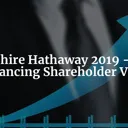Tags: Share Buyback
This fanpage is not officially affiliated with Berkshire Hathaway: Disclaimer
Attention, shareholders of Berkshire Hathaway! Get ready to dive into the fascinating world of share buybacks and uncover the financial maneuvers of the legendary Warren Buffett and Charlie Munger. This article takes you on a journey through Berkshire Hathaway's share buybacks in Q1-Q3 2023, offering insights into the company's strategies, the power duo's investment philosophies, and the impact on shareholder value. Discover the flexibility of the repurchase program, the numbers behind the buybacks, and the intriguing concept of intrinsic value. Brace yourselves for a thrilling ride through the world of Berkshire Hathaway's share buybacks!

Introduction
Berkshire Hathaway, a multinational conglomerate holding company, has always been a beacon of stability and growth in the global business landscape ↗. Under the leadership of the legendary Warren Buffett and Charlie Munger, the company has consistently delivered value to its shareholders. One of the key strategies employed by Berkshire Hathaway to enhance shareholder value is its share buyback program. This program, which allows the company to repurchase its own shares from the open market or through privately negotiated transactions, has been instrumental in the company's financial strategy. In this article, we will delve into the intricacies of Berkshire Hathaway's share buybacks in Q1-Q3 2023, offering insights into the company's financial maneuvers during this period.
The significance of share buybacks in a company's financial strategy cannot be overstated. By repurchasing its own shares, a company can return cash to its shareholders, reduce the number of outstanding shares, and potentially boost its earnings per share. Moreover, share buybacks can also signal the company's confidence in its own future prospects, thereby bolstering investor confidence. In the case of Berkshire Hathaway, the share buyback program has been a key component of its financial strategy, reflecting the company's commitment to delivering long-term value to its shareholders.
As we delve into the journey of Berkshire Hathaway's share buybacks in Q1-Q3 2023, we will uncover key facts and highlights that shed light on the company's financial strategy. We will explore the role of Warren Buffett and Charlie Munger in these decisions, the flexibility of the repurchase program, and the trends and patterns in the company's share buybacks. Additionally, we will delve into the concept of intrinsic value, the impact of these buybacks on the stock market, and the implications for investor sentiment and confidence.
The Power Duo: Warren Buffett and Charlie Munger
At the helm of Berkshire Hathaway's share buyback decisions are the formidable duo of Warren Buffett and Charlie Munger ↗. Their investment philosophy, deeply rooted in the principles of value investing, plays a pivotal role in guiding the timing and pricing of the company's share repurchases. They firmly believe in buying shares when the price is below the company's intrinsic value, a principle that has been instrumental in Berkshire Hathaway's financial success.
Warren Buffett, often referred to as the "Oracle of Omaha", is renowned for his disciplined approach to investing. He advocates for investing in companies with strong fundamentals and undervalued stocks, a philosophy that is reflected in Berkshire Hathaway's share buyback decisions. Charlie Munger, Buffett's long-time business partner, complements this philosophy with his razor-sharp focus on long-term growth and sustainability. Together, they have steered Berkshire Hathaway on a path of consistent growth and value creation.
Their belief in buying shares below the company's intrinsic value is a testament to their commitment to delivering long-term value to shareholders. By repurchasing shares when they believe the price is undervalued, they not only return cash to shareholders but also signal their confidence in the company's future prospects. This strategy has been instrumental in bolstering investor confidence and enhancing shareholder value.
The Repurchase Program Unveiled
Berkshire Hathaway's common stock repurchase program is a testament to the company's commitment to delivering value to its shareholders. This program, which allows the company to repurchase its own shares from the open market or through privately negotiated transactions, offers a high degree of flexibility. Importantly, there is no specified maximum number of shares to be repurchased, allowing the company to adapt its buyback strategy based on market conditions and its own financial position.
The flexibility of the program is further underscored by the fact that the total value of Berkshire's consolidated cash, cash equivalents, and U.S. Treasury Bill holdings cannot be reduced below $30 billion. This ensures that the company maintains a strong financial position, even as it returns cash to shareholders through share buybacks. Moreover, the program does not require Berkshire to repurchase a specific dollar amount or number of Class A or Class B shares, offering further flexibility in its buyback strategy.
Interestingly, there is no expiration date for the program, reflecting Berkshire Hathaway's long-term commitment to enhancing shareholder value through share buybacks. This open-ended approach allows the company to adapt its buyback strategy based on evolving market conditions and its own financial position, ensuring that it can consistently deliver value to its shareholders.
The Numbers Speak: Q1-Q3 2023 Share Buybacks
Berkshire Hathaway's share buyback activities in Q1-Q3 2023 offer intriguing insights into the company's financial strategy ↗. During this period, the company repurchased a significant number of Class A and Class B common stock shares, reflecting its commitment to returning cash to shareholders. The total investment made in these share buybacks offers a glimpse into the company's financial maneuvers during this period.
In January 2023, Berkshire Hathaway repurchased 468 Class A common stock shares for a total investment of $223 million ↗. In the same month, they also repurchased 1,323,333 Class B common stock shares for a total investment of $411 million. This trend continued in the subsequent months, with the company repurchasing a significant number of Class A and Class B common stock shares. A table of the buybacks can be found in the appendix.
If we're not mistaken, Berkshire has invested around $7.5B in share buybacks during Q1 to Q3 2023. Prices paid were around $300 up to $360 per BRK-B share.
Update February 2024: total share buybacks 2023 amounted to approximately $9 billion, see table in the appendix.
The trends and patterns in Berkshire Hathaway's share buybacks during this period offer intriguing insights into the company's financial strategy. The company's consistent focus on repurchasing its own shares, even in the face of fluctuating market conditions, is a testament to its commitment to delivering long-term value to its shareholders.
The Intrinsic Value Quest
The concept of intrinsic value is central to Berkshire Hathaway's share buyback decisions. Warren Buffett and Charlie Munger, the company's top decision-makers, firmly believe in buying shares when the price is below the company's intrinsic value. This belief is deeply rooted in their investment philosophy, which advocates for investing in undervalued stocks with strong fundamentals.
In assessing the intrinsic value of the company's shares, Buffett and Munger consider a range of factors, including the company's financial performance, growth prospects, and market conditions. Their disciplined approach to investing, combined with their deep understanding of the company's business, enables them to make informed decisions about when to repurchase shares.
The alignment of share repurchases with the company's long-term growth prospects is a key aspect of Berkshire Hathaway's financial strategy. By repurchasing shares when they believe the price is undervalued, Buffett and Munger not only return cash to shareholders but also signal their confidence in the company's future prospects. This strategy has been instrumental in bolstering investor confidence and enhancing shareholder value.
Market Impact and Investor Sentiment
Berkshire Hathaway's share buybacks have a significant impact on the stock market. By repurchasing its own shares, the company reduces the number of outstanding shares, potentially boosting its earnings per share. Moreover, share buybacks can also signal the company's confidence in its own future prospects, thereby bolstering investor confidence.
The market's perception of the company's buyback activities is a key factor in determining its stock price. If the market perceives the buybacks as a sign of the company's confidence in its future prospects, it can boost the stock price. Conversely, if the market perceives the buybacks as a sign of the company's lack of investment opportunities, it can put downward pressure on the stock price.
The potential implications for investor sentiment and confidence are also significant. Share buybacks can bolster investor confidence by signaling the company's confidence in its own future prospects. Moreover, by returning cash to shareholders, share buybacks can enhance shareholder value, thereby boosting investor sentiment.
The Price Tag: Stock Performance and Market Capitalization
Berkshire Hathaway's stock performance during Q1-Q3 2023 offers intriguing insights into the company's financial health. The closing price on November 3, 2023, was $351.81, reflecting a stock price increase of $2.79 or 0.80%. This increase in stock price, coupled with the company's consistent focus on share buybacks, is a testament to its financial strength.
The market capitalization of Berkshire Hathaway Inc., which stands at $761.658 billion, is a key indicator of the company's financial position. Market capitalization, which represents the total market value of a company's outstanding shares of stock, is a key metric used by investors to assess a company's size and growth potential. In the case of Berkshire Hathaway, its substantial market capitalization reflects its strong financial position and growth prospects.
Conclusion: Shareholders of Berkshire Hathaway
The journey of Berkshire Hathaway's share buybacks in Q1-Q3 2023 offers valuable insights into the company's financial strategy. The company's consistent focus on repurchasing its own shares, guided by the investment philosophy of Warren Buffett and Charlie Munger, is a testament to its commitment to delivering long-term value to its shareholders.
The impact of these share repurchases on shareholders' value and confidence cannot be overstated. By returning cash to shareholders and signaling their confidence in the company's future prospects, Berkshire Hathaway has bolstered investor confidence and enhanced shareholder value.
For shareholders of Berkshire Hathaway, understanding the company's buyback strategy is crucial. This strategy, which is deeply rooted in the investment philosophy of Warren Buffett and Charlie Munger, offers valuable insights into the company's financial maneuvers and growth prospects. As we look ahead, the company's commitment to delivering long-term value to its shareholders through its share buyback program remains a beacon of stability and growth in the global business landscape.
References
- www.berkshirehathaway.com: Third Quarter 2023 as well as the other fomer quarters in 2023 on Berkshire's website
- finance.yahoo.com: Berkshire Hathaway Inc. (BRK-B) Stock Price, News, Quote & History - Yahoo Finance
Appendix: Berkshire Hathaway Share Buybacks 2023 Overview
The below table has been updated using the annual report for that year, see Berkshire Hathaway's 2023 Triumph: Lessons Unveiled. In total, Berkshire has invested close to $9 billion during 2023 for stock repurchases!
| Period | Total Number of Shares Purchased | Average Price Paid per Share | Investment for Purchase |
|---|---|---|---|
| January | Class A: 468 | $475,158.19 | $223M |
| Class B: 1,323,333 | $310.87 | $411M | |
| February | Class A: 249 | $464,461.13 | $116M |
| Class B: 892,938 | $304.58 | $272M | |
| March | Class A: 4,386 | $465,791.01 | $2,041M |
| Class B: 4,500,593 | $305.57 | $1,374M | |
| April | Class A: 177 | $472,004.70 | $84M |
| Class B: 220,351 | $308.57 | $68M | |
| May | Class A: 238 | $493,507.36 | $118M |
| Class B | N/A | N/A | |
| June | Class A: 627 | $506,476.84 | $317M |
| Class B: 2,134,093 | $335.55 | $715M | |
| July | Class A: 177 | $521,430.04 | $92M |
| Class B | N/A | N/A | |
| August | Class A: 607 | $541,740.69 | $329M |
| Class B | N/A | N/A | |
| September | Class A: 1,115 | $550,813.96 | $614M |
| Class B: 143,675 | $357.22 | $51M | |
| October | Class A: 1,815 | $522,756.10 | $949 |
| Class B | N/A | N/A | |
| November | Class A: 1,705 | $536,048.49 | $914M |
| Class B: 660,585 | $347.16 | $229M | |
| December | Class A: 103 | $541,062.03 | $56M |
| Class B | N/A | N/A | |
| 2023 | $8.973 billion |












